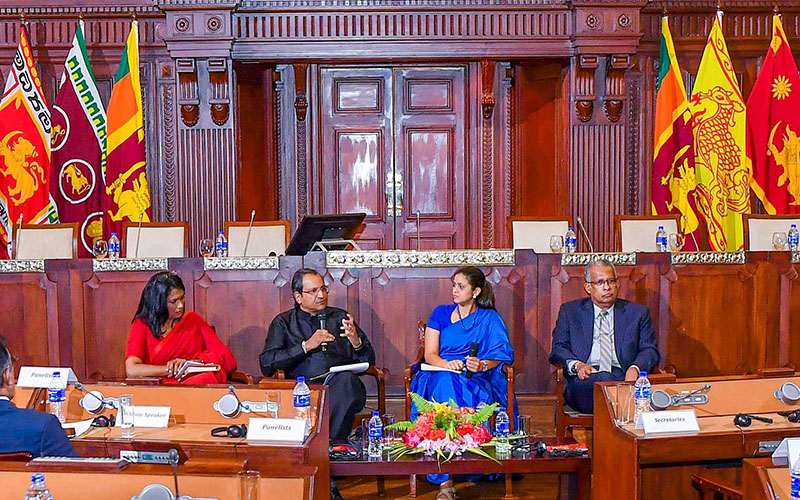December 20, 2023 Reading Time: 3 minutes

Reading Time: 3 min read
Executive Director of LKI Ambassador Ravinatha Aryasinha participated in a panel discussion on ‘Celebrating for a Better Sri Lanka – Unlocking the Potentials’ on 18 December 2023, in celebration of the International Migrants Day 2023. The event was organized by the Office for Overseas Sri Lankan Affairs (OOSLA) and was held at the Presidential Secretariat, in recognition of the invaluable contributions made by the Overseas Sri Lankans (OSLs), and with a view to further strengthen the engagement with OSLs.
On this occasion, Foreign Minister Ali Sabry and Senior Advisor to the President on National Security and Chief of Staff Sagala Ratnayaka launched the official website of OOSLA and addressed the gathering. The Chief of the International Organization of Migration (IOM) Sarath Dash and Director General of the OOSLA Mr. V. Krishnamurthy also spoke, while the keynote address was delivered by Professor Emeritus Lakshman Samaranayake of the University of Hong Kong.
The panel discussion moderated by Dr. Pavithra Jayawardane Senior Lecturer of the Faculty of Arts, University of Colombo, was also joined by Ambassador Prasad Kariyawasam, Member of the UN Committee on the Rights of the Migrant Workers and the Welfare of their Families (CMW), Dr. Bilesha Weeraratne Research Fellow, Head of Migration and Urbanization Research, Institute of Policy Studies (IPS), Dr. Raj Barr-Kumar Distinguished OSL from USA Former President, American Institute of Architects.
Focussing on the Politico-Institutional dimension of OSL engagement, Ambassador Aryasinha described the OSL community as constituting both short term migrants who are temporarily employed abroad and those more permanently settled abroad. He noted that while successive Sri Lankan governments have engaged the OSLs, success in ensuring that particularly those permanently settled remained engaged has been challenging in some respects.
He outlined that Sri Lanka through its consular services has supported OSLs without distinction and national/religio-cultural events organized by Embassies helped keep communities, particularly children, connected to their home country and its culture. Highlighting the ways in which OSLs reciprocate this support, he noted that crisis periods such as the aftermath of Tsunami, COVID, and even the more recent economic crisis has shown that OSL community have remained deeply concerned about their country and communities back home, and Embassies have also shown capability in galvanizing this support from the OSLs. Additionally, OSLs besides regular remittances to Sri Lanka – which at its height amounted to nearly 10% of the GDP, have also been involved in creating educational linkages, supporting SMEs, besides their support to their extended family, schools, community and to other socio-cultural causes.
Ambassador Aryasinha noted that despite this, particularly with respect to those permanently settled abroad, there has at times been a disconnect between what Sri Lanka as a state was expecting and what the OSLs were willing to give in the different periods of time, which he analysed both in functional, as well as structural terms. He said functionally, in comparison with overseas resident communities of other comparable countries, notwithstanding several attempts made, Sri Lanka OSLs have shown hesitancy to invest in Sri Lanka in a sizable manner, while ethnicity-based divisions have also come into play in harnessing the full potential of the Sri Lankan OSLs. Additionally, due to their unique status, OSLs also face difficulties that arise on account of their own dilemmas, as well as the vulnerability resulting from being sandwiched between their home state and the host state. At the same time from a structural standpoint, he noted that in the past sometimes there has been a conceptual and structural disconnect on the part of the Sri Lankan state in reaching out to the OSL community, with frequent changes on both approach and institutional focal points that did so.
In this context, Ambassador Aryasinha said the creation a year ago (in December 2022) of the Office for Overseas Sri Lanka Affairs (OOSLA) within the Presidential Secretariat provides a new opportunity to view the attendant issues in a more wholistic light, and as set out by Director General Krishnamoorthy, to evolve “a more stable, inclusive and mutually beneficial relationship with the OSL community”, availing of “the broader convening power” of the Presidential Secretariat. He said this must be done with respect to both those permanently settled, as well as the Sri Lankan Migrant workforce living across the world, in coordination with the connected Sri Lanka government, private sector institutions and foreign governments. While commending the OOSLA for its innovative early moves to make a difference, and in addressing some of the concerns of the past, he emphasized the need for KPI-driven efforts which enables evaluation of progress, and to benefit from ‘feedback’ to correct course where necessary, in order to develop a sustainable relationship between Sri Lanka and its OSL community.